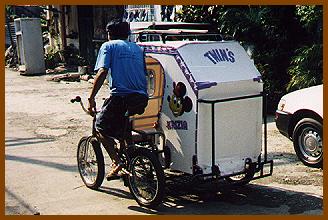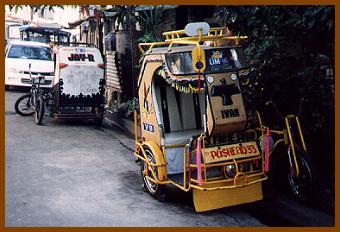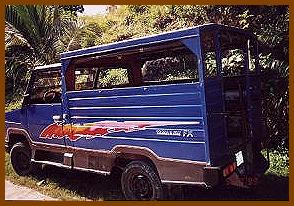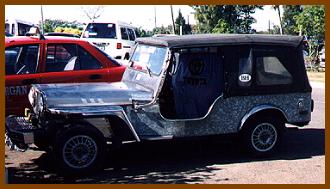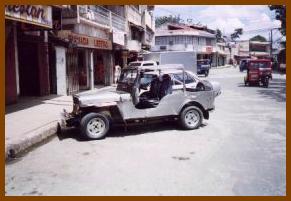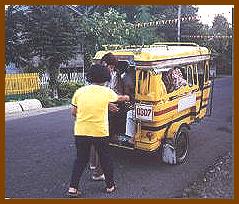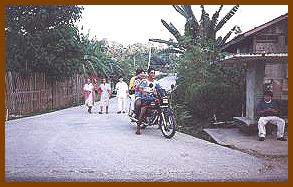My Collection of Vehicles from
The Philippines
-o0o-
I love cars. I love to
drive, and sometimes I even enjoy working on them. I have been involved in
recreational off-highway driving, - motorcycles,- ATV Quads and 4-Wheel
drives for the past 30 years, and am fascinated by the vehicles of the
Philippines. Here is a collection of motorized and non-motorized vehicles.
-o0o-
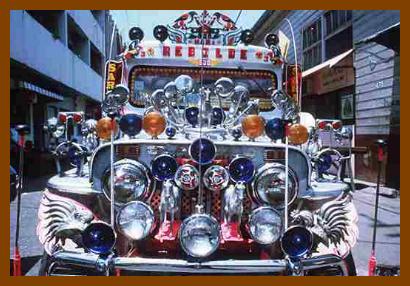
JEEPNEY
The jeepney was originally developed
from discarded and left over US military vehicles. They were extended in
length and have two bench seats facing each other. A driver jokingly told
me the name came from "You ride in a Jeep and when you sit, you touch Knees
- that's why we call it -"Jeep-Knees". The owners originally
dressed them up to encourage ridership. Most of the vehicles are now built new,
from the ground up, and with used parts - (engines, Transmissions, and
axles) imported from Japan. Jeepneys have been also called
"Folk Art on Wheels" and some of them are spectacular. 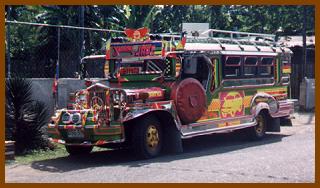 They
all have loud distintive horns and the driver blows it at everyone and
everything. They make for very efficient public transportation. The
rates are preset, and determined by distance traveled. The owner buys a permit
or license to drive a certain route, called "Boundary" and he must
stay on that route. The route is usually written on the side for
example: "Carbon Market - Jones Blvd - Fuente Osmena and Vice
Versa". This means the Jeepney will travel between the Carbon
Market and Osmena Circle only along Jones Blvd. This
makes traveling in Cebu easy. To get off at a particular street, you
merely tap your peso coin on the roof, and the conductor will yell for the
driver to stop. After you get off and new passengers are seated the driver
yells "Sige!" (That's it, or Thats all) and we're off.
They
all have loud distintive horns and the driver blows it at everyone and
everything. They make for very efficient public transportation. The
rates are preset, and determined by distance traveled. The owner buys a permit
or license to drive a certain route, called "Boundary" and he must
stay on that route. The route is usually written on the side for
example: "Carbon Market - Jones Blvd - Fuente Osmena and Vice
Versa". This means the Jeepney will travel between the Carbon
Market and Osmena Circle only along Jones Blvd. This
makes traveling in Cebu easy. To get off at a particular street, you
merely tap your peso coin on the roof, and the conductor will yell for the
driver to stop. After you get off and new passengers are seated the driver
yells "Sige!" (That's it, or Thats all) and we're off.
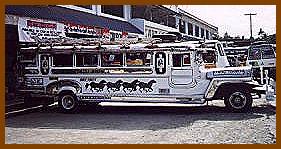
Narcing in a Sarao Motors
Stainless Steel Jeepney
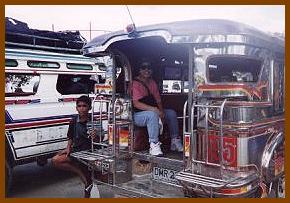
The nieces, Anne, Aileen.
Lilibeth,and Antoinette
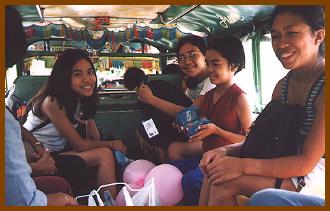
-o0o-
TAMARAW
The Tamaraw (Toyota) - the
Volkswagen of asia, you see this vehicle in a thousand configurations, Taxi,
Open Truck, Jeepney, Panel Van, Ambulance, Family car, Police Car. comes in 2 or
4 wheel drive. gasoline or diesel. I didn't see any automatic transmissions. Very simply laid out and very
easy to work on. We have friends who bought a new one as a family car,
nicely upholstered, and with Air, Stereo, and nicely finished as a SUV for
about $7,000. The blue one is an older model used as a jeepney, but actually a
family car.
I didn't see any automatic transmissions. Very simply laid out and very
easy to work on. We have friends who bought a new one as a family car,
nicely upholstered, and with Air, Stereo, and nicely finished as a SUV for
about $7,000. The blue one is an older model used as a jeepney, but actually a
family car.
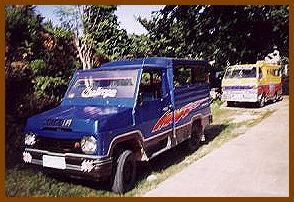
A Tamaraw Taxi,
(they even have a
separate
Air-Con in the back seat)
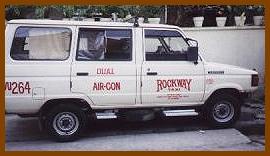
-o0o-
MOTORCAB
Motor-Cabs. These are very
popular, a new one cost less than $5000. They are made by Suzuki,
Kawasaki, Daewoo, and others. They have very small engines, (less
than 1200 cc) Seat 8 to 10 comfortably in the rear as a jeepney, but will carry
more than twice that number. They also come in other configurations, as a
delivery truck or with a pick-up bed.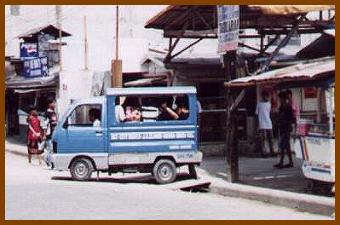 The commercial jeepney service owners apply for a license or permit to run a
route, called "Boundary" The driver has to stay on that specific
route and pick up and discharge passengers as he goes along. The fare is pre-set
by the local officials, and the driver is usually paid a daily wage (P200) -$5-
plus percentage of the fares by the owner of the motorcab. Or the driver
rents the vehicle and after paying for fuel and the conductor, keeps the
profit. From the drivers own wages he will hire a youngster to act
as the conductor who helps him by loading and unloading passengers and
freight.
The commercial jeepney service owners apply for a license or permit to run a
route, called "Boundary" The driver has to stay on that specific
route and pick up and discharge passengers as he goes along. The fare is pre-set
by the local officials, and the driver is usually paid a daily wage (P200) -$5-
plus percentage of the fares by the owner of the motorcab. Or the driver
rents the vehicle and after paying for fuel and the conductor, keeps the
profit. From the drivers own wages he will hire a youngster to act
as the conductor who helps him by loading and unloading passengers and
freight. 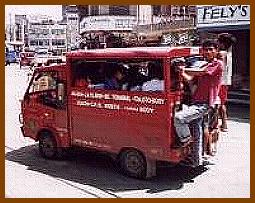
Someone may buy a 50 kilo sack of rice (110lbs.) to take home, and this amazing,
skinny little 100 pound kid, will throw it up on the roof. In order to
make some money the driver has to be as efficient as possible and not waste any
time. The conductor will load the passengers, telling kids to sit on
someone's lap, and even put stools in the center. With the conductor hanging off
the rear step, the vehicle now will carry about twice what it should, and
probably need a new clutch by next week.
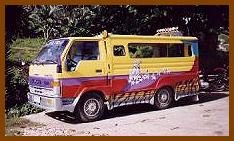
-o0o-
NEW "JEEPs"
The first one I saw up-close was in
Manila. From a distance it looked like a Jeep but was lower to the
ground, and the tail lights didn't look right. 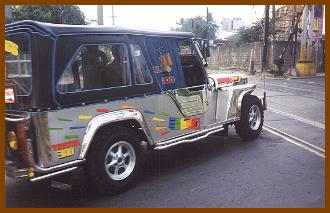 On
close inspection I realized it wasn't a Jeep, but a copy. The flat fenders were
made of stainless steel and the side panels were made from galvanized sheet
metal. Pretty smart if you are in a damp and humid environment. The
owner came over and talked to me and opened the hood revealing a 4-clyinder
Mitsubishi engine. I learned a "Brand New" one (built from
reconditioned parts cost about P200,000. ($5,200). They kind of reminded
me of the DELOREAN, all silver in color. This one with the bright graphics
is brand new and the others are older. They are very popular and I have
seen them all over the country. This is a real nice family car, easy
to service and very durable. They don't have a lot of "Extras"
on them other than a radio/stereo.
On
close inspection I realized it wasn't a Jeep, but a copy. The flat fenders were
made of stainless steel and the side panels were made from galvanized sheet
metal. Pretty smart if you are in a damp and humid environment. The
owner came over and talked to me and opened the hood revealing a 4-clyinder
Mitsubishi engine. I learned a "Brand New" one (built from
reconditioned parts cost about P200,000. ($5,200). They kind of reminded
me of the DELOREAN, all silver in color. This one with the bright graphics
is brand new and the others are older. They are very popular and I have
seen them all over the country. This is a real nice family car, easy
to service and very durable. They don't have a lot of "Extras"
on them other than a radio/stereo.
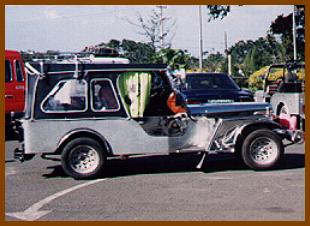
-o0o-
TRICYCLE TAXI
The tricycle Taxi is popular all over
too, they are small motorcycles, 125, 175cc with a covered steel side car
attached. The fare varies a little especially if you want to go out of
town. The drivers would rather pick up short fares around the city going
from store to store. They don't get too excited when you want to go home
to the suburbs.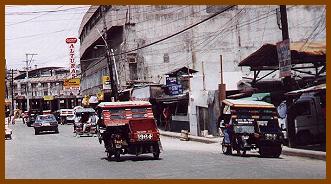 They seat two adults in the cab, one more adult rides side-saddle behind
the driver, and you can carry luggage in the little trunk in the
back. We took one from sister Olive's house to Tagbiliran City.
Carrying Narcing, Olive, myself, plus two of Olives kids, and the
driver. I'll guess about 650, 700 pounds. The fare was 15peso
(40c) and I'll bet the little 125cc Yamaha will need a new clutch in
a week. In Valencia they don't have these side car taxis but rather
this little three wheel affair, which they still call tricycle. This has a
cab with seating for four or six in the rear, and the cab is behind the
motorcycle. there are two real small seats facing forward behind the driver on
either side.
They seat two adults in the cab, one more adult rides side-saddle behind
the driver, and you can carry luggage in the little trunk in the
back. We took one from sister Olive's house to Tagbiliran City.
Carrying Narcing, Olive, myself, plus two of Olives kids, and the
driver. I'll guess about 650, 700 pounds. The fare was 15peso
(40c) and I'll bet the little 125cc Yamaha will need a new clutch in
a week. In Valencia they don't have these side car taxis but rather
this little three wheel affair, which they still call tricycle. This has a
cab with seating for four or six in the rear, and the cab is behind the
motorcycle. there are two real small seats facing forward behind the driver on
either side.
These cabs run up and down the Provincial Highway, going between the city
limits, the market and the church. they will pick up fares as they
go. You don't usually hire the whole cab for one ride but will share if
the driver stops to pick some one up.
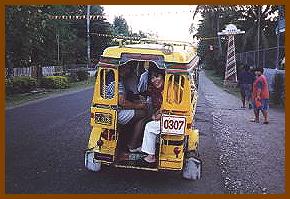

-o0o-
HABAL-HABAL
The most popular form of taxi in the
town of Valencia is called "Habal-Habal" notice the rack/seat attached
to the rear of the motorcycle and the foot rests and guards to keep your
legs away from the exhaust. 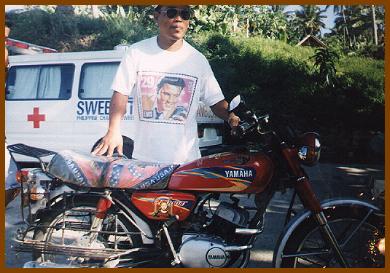 The
driver will carry as many as FIVE PEOPLE and the ride is really
exciting. I think it is really dangerous going up or down hill from the barrio
on the dirt roads. I have ridden motorcycles both off-road and on for
years, and I'm not too thrilled to take the Habal-Habal. The fare is three
to five peso, depending on how far you want to go.
The
driver will carry as many as FIVE PEOPLE and the ride is really
exciting. I think it is really dangerous going up or down hill from the barrio
on the dirt roads. I have ridden motorcycles both off-road and on for
years, and I'm not too thrilled to take the Habal-Habal. The fare is three
to five peso, depending on how far you want to go.
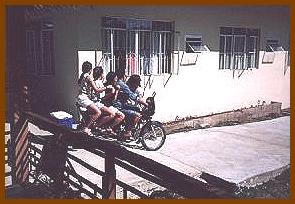
-o0o-
PEDAL CAB
The cheapest form of transportation,
used mostly in the city and the terrain has to be pretty flat. Here is a
picture of Brother-in-law Bob, re living his youth, showing daughter
Antoinette how its done and by pure coincidence the driver is a distant nephew
of Bob's.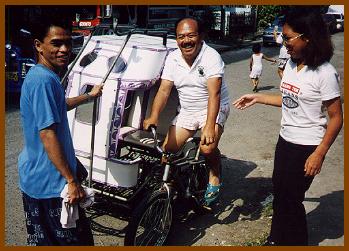 Never the less Bob paid full fare. a similar arrangement works here. The
driver rents the cab for about a dollar a day, which comes with a
paid "boundary". He then keeps all he earns, this kid said
he made around 300-400 pesos ($8-10) on a good day. Thats a lot of work at
1-2 pesos a ride if you ask me. I also saw a few open side car bicycles
used for delivery of Coca-Cola, and this door-to-door peddler in Manila,
was selling plastic pails and stools off of hers.
Never the less Bob paid full fare. a similar arrangement works here. The
driver rents the cab for about a dollar a day, which comes with a
paid "boundary". He then keeps all he earns, this kid said
he made around 300-400 pesos ($8-10) on a good day. Thats a lot of work at
1-2 pesos a ride if you ask me. I also saw a few open side car bicycles
used for delivery of Coca-Cola, and this door-to-door peddler in Manila,
was selling plastic pails and stools off of hers.
